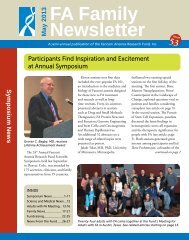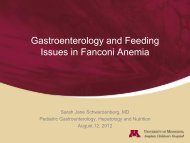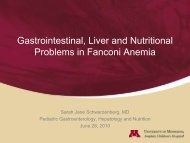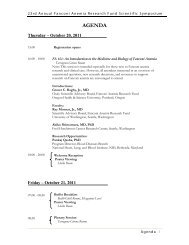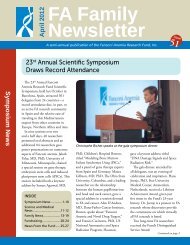- Page 1 and 2:
Fanconi Anemia: Guidelines for Diag
- Page 3 and 4:
We are deeply grateful to the follo
- Page 5 and 6:
iv Fanconi Anemia: Guidelines for D
- Page 7 and 8:
vi Fanconi Anemia: Guidelines for D
- Page 9 and 10:
8 Fanconi Anemia: Guidelines for Di
- Page 11 and 12:
10 Fanconi Anemia: Guidelines for D
- Page 13 and 14:
12 Fanconi Anemia: Guidelines for D
- Page 15 and 16:
14 Fanconi Anemia: Guidelines for D
- Page 17 and 18:
16 Fanconi Anemia: Guidelines for D
- Page 19 and 20:
18 Fanconi Anemia: Guidelines for D
- Page 21 and 22:
20 Fanconi Anemia: Guidelines for D
- Page 23 and 24:
22 Fanconi Anemia: Guidelines for D
- Page 25 and 26:
24 Fanconi Anemia: Guidelines for D
- Page 27 and 28:
26 Fanconi Anemia: Guidelines for D
- Page 29 and 30:
28 Fanconi Anemia: Guidelines for D
- Page 31 and 32:
30 Fanconi Anemia: Guidelines for D
- Page 33 and 34:
32 Fanconi Anemia: Guidelines for D
- Page 35 and 36:
34 Fanconi Anemia: Guidelines for D
- Page 37 and 38:
36 Fanconi Anemia: Guidelines for D
- Page 39 and 40:
38 Fanconi Anemia: Guidelines for D
- Page 41 and 42:
40 Fanconi Anemia: Guidelines for D
- Page 43 and 44:
42 Fanconi Anemia: Guidelines for D
- Page 45 and 46:
44 Fanconi Anemia: Guidelines for D
- Page 47 and 48:
46 Fanconi Anemia: Guidelines for D
- Page 49 and 50:
48 Fanconi Anemia: Guidelines for D
- Page 51 and 52:
50 Fanconi Anemia: Guidelines for D
- Page 53 and 54:
52 Fanconi Anemia: Guidelines for D
- Page 55 and 56:
54 Fanconi Anemia: Guidelines for D
- Page 57 and 58:
56 Fanconi Anemia: Guidelines for D
- Page 59 and 60:
58 Fanconi Anemia: Guidelines for D
- Page 61 and 62:
60 Fanconi Anemia: Guidelines for D
- Page 63 and 64:
62 Fanconi Anemia: Guidelines for D
- Page 65 and 66:
64 Fanconi Anemia: Guidelines for D
- Page 67 and 68:
66 Fanconi Anemia: Guidelines for D
- Page 69 and 70:
68 Fanconi Anemia: Guidelines for D
- Page 71 and 72:
70 Fanconi Anemia: Guidelines for D
- Page 73 and 74:
72 Fanconi Anemia: Guidelines for D
- Page 75 and 76:
74 Fanconi Anemia: Guidelines for D
- Page 77 and 78:
Chapter 4 Gastrointestinal, Hepatic
- Page 79 and 80:
78 Fanconi Anemia: Guidelines for D
- Page 81 and 82:
80 Fanconi Anemia: Guidelines for D
- Page 83 and 84:
82 Fanconi Anemia: Guidelines for D
- Page 85 and 86:
84 Fanconi Anemia: Guidelines for D
- Page 87 and 88:
86 Fanconi Anemia: Guidelines for D
- Page 89 and 90: 88 Fanconi Anemia: Guidelines for D
- Page 91 and 92: 90 Fanconi Anemia: Guidelines for D
- Page 93 and 94: 92 Fanconi Anemia: Guidelines for D
- Page 95 and 96: 94 Fanconi Anemia: Guidelines for D
- Page 97 and 98: 96 Fanconi Anemia: Guidelines for D
- Page 99 and 100: 98 Fanconi Anemia: Guidelines for D
- Page 101 and 102: 100 Fanconi Anemia: Guidelines for
- Page 103 and 104: 102 Fanconi Anemia: Guidelines for
- Page 105 and 106: 104 Fanconi Anemia: Guidelines for
- Page 107 and 108: 106 Fanconi Anemia: Guidelines for
- Page 109 and 110: 108 Fanconi Anemia: Guidelines for
- Page 111 and 112: 110 Fanconi Anemia: Guidelines for
- Page 113 and 114: 112 Fanconi Anemia: Guidelines for
- Page 115 and 116: 114 Fanconi Anemia: Guidelines for
- Page 117 and 118: 116 Fanconi Anemia: Guidelines for
- Page 119 and 120: 118 Fanconi Anemia: Guidelines for
- Page 121 and 122: 120 Fanconi Anemia: Guidelines for
- Page 123 and 124: 122 Fanconi Anemia: Guidelines for
- Page 125 and 126: 124 Fanconi Anemia: Guidelines for
- Page 127 and 128: 126 Fanconi Anemia: Guidelines for
- Page 129 and 130: 128 Fanconi Anemia: Guidelines for
- Page 131 and 132: 130 Fanconi Anemia: Guidelines for
- Page 133 and 134: 132 Fanconi Anemia: Guidelines for
- Page 135 and 136: Chapter 7 Endocrine Disorders in Fa
- Page 137 and 138: 136 Fanconi Anemia: Guidelines for
- Page 139: 138 Fanconi Anemia: Guidelines for
- Page 143 and 144: 142 Fanconi Anemia: Guidelines for
- Page 145 and 146: 144 Fanconi Anemia: Guidelines for
- Page 147 and 148: 146 Fanconi Anemia: Guidelines for
- Page 149 and 150: 148 Fanconi Anemia: Guidelines for
- Page 151 and 152: 150 Fanconi Anemia: Guidelines for
- Page 153 and 154: 152 Fanconi Anemia: Guidelines for
- Page 155 and 156: 154 Fanconi Anemia: Guidelines for
- Page 157 and 158: 156 Fanconi Anemia: Guidelines for
- Page 159 and 160: 158 Fanconi Anemia: Guidelines for
- Page 161 and 162: 160 Fanconi Anemia: Guidelines for
- Page 163 and 164: 162 Fanconi Anemia: Guidelines for
- Page 165 and 166: 164 Fanconi Anemia: Guidelines for
- Page 167 and 168: 166 Fanconi Anemia: Guidelines for
- Page 169 and 170: 168 Fanconi Anemia: Guidelines for
- Page 171 and 172: 170 Fanconi Anemia: Guidelines for
- Page 173 and 174: 172 Fanconi Anemia: Guidelines for
- Page 175 and 176: 174 Fanconi Anemia: Guidelines for
- Page 177 and 178: 176 Fanconi Anemia: Guidelines for
- Page 179 and 180: Chapter 9 Matched Sibling Donor Hem
- Page 181 and 182: 180 Fanconi Anemia: Guidelines for
- Page 183 and 184: 182 Fanconi Anemia: Guidelines for
- Page 185 and 186: 184 Fanconi Anemia: Guidelines for
- Page 187 and 188: 186 Fanconi Anemia: Guidelines for
- Page 189 and 190: 188 Fanconi Anemia: Guidelines for
- Page 191 and 192:
190 Fanconi Anemia: Guidelines for
- Page 193 and 194:
192 Fanconi Anemia: Guidelines for
- Page 195 and 196:
194 Fanconi Anemia: Guidelines for
- Page 197 and 198:
196 Fanconi Anemia: Guidelines for
- Page 199 and 200:
198 Fanconi Anemia: Guidelines for
- Page 201 and 202:
200 Fanconi Anemia: Guidelines for
- Page 203 and 204:
202 Fanconi Anemia: Guidelines for
- Page 205 and 206:
204 Fanconi Anemia: Guidelines for
- Page 207 and 208:
206 Fanconi Anemia: Guidelines for
- Page 209 and 210:
208 Fanconi Anemia: Guidelines for
- Page 211 and 212:
210 Fanconi Anemia: Guidelines for
- Page 213 and 214:
212 Fanconi Anemia: Guidelines for
- Page 215 and 216:
214 Fanconi Anemia: Guidelines for
- Page 217 and 218:
216 Fanconi Anemia: Guidelines for
- Page 219 and 220:
218 Fanconi Anemia: Guidelines for
- Page 221 and 222:
220 Fanconi Anemia: Guidelines for
- Page 223 and 224:
222 Fanconi Anemia: Guidelines for
- Page 225 and 226:
224 Fanconi Anemia: Guidelines for
- Page 227 and 228:
226 Fanconi Anemia: Guidelines for
- Page 229 and 230:
228 Fanconi Anemia: Guidelines for
- Page 231 and 232:
230 Fanconi Anemia: Guidelines for
- Page 233 and 234:
232 Fanconi Anemia: Guidelines for
- Page 235 and 236:
234 Fanconi Anemia: Guidelines for
- Page 237 and 238:
Chapter 12 Novel Treatment Options
- Page 239 and 240:
238 Fanconi Anemia: Guidelines for
- Page 241 and 242:
240 Fanconi Anemia: Guidelines for
- Page 243 and 244:
242 Fanconi Anemia: Guidelines for
- Page 245 and 246:
244 Fanconi Anemia: Guidelines for
- Page 247 and 248:
246 Fanconi Anemia: Guidelines for
- Page 249 and 250:
248 Fanconi Anemia: Guidelines for
- Page 251 and 252:
Chapter 13 Head and Neck Squamous C
- Page 253 and 254:
252 Fanconi Anemia: Guidelines for
- Page 255 and 256:
254 Fanconi Anemia: Guidelines for
- Page 257 and 258:
256 Fanconi Anemia: Guidelines for
- Page 259 and 260:
258 Fanconi Anemia: Guidelines for
- Page 261 and 262:
260 Fanconi Anemia: Guidelines for
- Page 263 and 264:
262 Fanconi Anemia: Guidelines for
- Page 265 and 266:
Chapter 14 The Adult Fanconi Anemia
- Page 267 and 268:
266 Fanconi Anemia: Guidelines for
- Page 269 and 270:
268 Fanconi Anemia: Guidelines for
- Page 271 and 272:
270 Fanconi Anemia: Guidelines for
- Page 273 and 274:
272 Fanconi Anemia: Guidelines for
- Page 275 and 276:
274 Fanconi Anemia: Guidelines for
- Page 277 and 278:
276 Fanconi Anemia: Guidelines for
- Page 279 and 280:
278 Fanconi Anemia: Guidelines for
- Page 281 and 282:
280 Fanconi Anemia: Guidelines for
- Page 283 and 284:
282 Fanconi Anemia: Guidelines for
- Page 285 and 286:
284 Fanconi Anemia: Guidelines for
- Page 287 and 288:
286 Fanconi Anemia: Guidelines for
- Page 289 and 290:
288 Fanconi Anemia: Guidelines for
- Page 291 and 292:
290 Fanconi Anemia: Guidelines for
- Page 293 and 294:
292 Fanconi Anemia: Guidelines for
- Page 295 and 296:
294 Fanconi Anemia: Guidelines for
- Page 297 and 298:
296 Fanconi Anemia: Guidelines for
- Page 299 and 300:
298 Fanconi Anemia: Guidelines for
- Page 301 and 302:
300 Fanconi Anemia: Guidelines for
- Page 303 and 304:
302 Fanconi Anemia: Guidelines for
- Page 305 and 306:
304 Fanconi Anemia: Guidelines for
- Page 307 and 308:
306 Fanconi Anemia: Guidelines for
- Page 309 and 310:
308 Fanconi Anemia: Guidelines for
- Page 311 and 312:
310 Fanconi Anemia: Guidelines for
- Page 313 and 314:
312 Fanconi Anemia: Guidelines for
- Page 315 and 316:
314 Fanconi Anemia: Guidelines for
- Page 317 and 318:
316 Fanconi Anemia: Guidelines for
- Page 319 and 320:
318 Fanconi Anemia: Guidelines for
- Page 321 and 322:
320 Fanconi Anemia: Guidelines for
- Page 323 and 324:
322 Fanconi Anemia: Guidelines for
- Page 325 and 326:
324 Fanconi Anemia: Guidelines for
- Page 327 and 328:
326 Fanconi Anemia: Guidelines for
- Page 329 and 330:
328 Fanconi Anemia: Guidelines for
- Page 331 and 332:
330 Fanconi Anemia: Guidelines for
- Page 333 and 334:
332 Fanconi Anemia: Guidelines for
- Page 335 and 336:
334 Fanconi Anemia: Guidelines for
- Page 337 and 338:
336 Fanconi Anemia: Guidelines for
- Page 339 and 340:
338 Fanconi Anemia: Guidelines for
- Page 341 and 342:
340 Fanconi Anemia: Guidelines for
- Page 343 and 344:
342 Fanconi Anemia: Guidelines for
- Page 345 and 346:
344 Fanconi Anemia: Guidelines for
- Page 347 and 348:
346 Fanconi Anemia: Guidelines for
- Page 349 and 350:
348 Fanconi Anemia: Guidelines for
- Page 351 and 352:
350 Fanconi Anemia: Guidelines for
- Page 353 and 354:
352 Fanconi Anemia: Guidelines for
- Page 355 and 356:
354 Fanconi Anemia: Guidelines for
- Page 357 and 358:
356 Fanconi Anemia: Guidelines for
- Page 359 and 360:
358 Fanconi Anemia: Guidelines for
- Page 361 and 362:
360 Fanconi Anemia: Guidelines for
- Page 363 and 364:
362 Fanconi Anemia: Guidelines for
- Page 365 and 366:
364 Fanconi Anemia: Guidelines for
- Page 367 and 368:
366 Fanconi Anemia: Guidelines for
- Page 369 and 370:
368 Fanconi Anemia: Guidelines for
- Page 371 and 372:
370 Fanconi Anemia: Guidelines for
- Page 373 and 374:
372 Fanconi Anemia: Guidelines for
- Page 375 and 376:
374 Fanconi Anemia: Guidelines for
- Page 377 and 378:
376 Fanconi Anemia: Guidelines for
- Page 379 and 380:
378 Fanconi Anemia: Guidelines for
- Page 381 and 382:
380 Fanconi Anemia: Guidelines for
- Page 383 and 384:
382 Fanconi Anemia: Guidelines for
- Page 385 and 386:
384 Fanconi Anemia: Guidelines for
- Page 387 and 388:
386 Fanconi Anemia: Guidelines for
- Page 389 and 390:
388 Fanconi Anemia: Guidelines for
- Page 391 and 392:
390 Fanconi Anemia: Guidelines for






